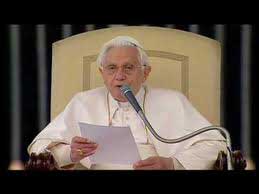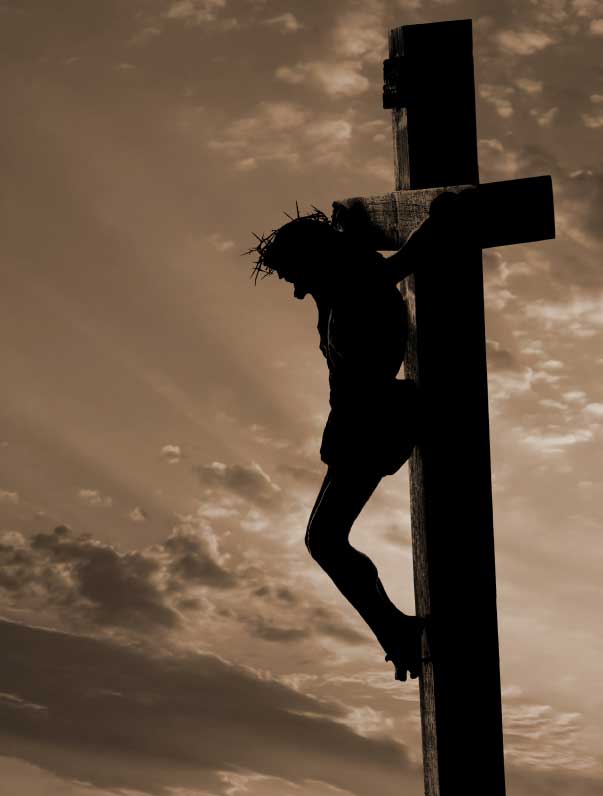
Vatican City, 8 February 2012 (VIS) – The prayer of Jesus at the moment of His death, as narrated by St. Mark and St. Matthew was the theme of Benedict XVI’s catechesis during his general audience, held this morning in the Paul VI Hall.
Yet, the Holy Father asked, “what is the meaning of Jesus’ prayer? The cry addressed to the Father: ‘my God, my God, why have you  forsaken me?'” He explained that “the words Jesus addresses to the Father are the beginning of Psalm 22, in which the Psalmist expresses the tension between, on the one hand, being left alone and, on the other, the certain knowledge of God’s presence amongst His people. … The Psalmist speaks of a ‘cry’ to express all the suffering of his prayer before the apparently absent God. At moments of anguish prayer becomes a cry.
forsaken me?'” He explained that “the words Jesus addresses to the Father are the beginning of Psalm 22, in which the Psalmist expresses the tension between, on the one hand, being left alone and, on the other, the certain knowledge of God’s presence amongst His people. … The Psalmist speaks of a ‘cry’ to express all the suffering of his prayer before the apparently absent God. At moments of anguish prayer becomes a cry.
“This also happens in our own relationship with the Lord”, the Pope added. “In the face of difficult and painful situations, when it seems that God does not hear, we must not be afraid to entrust Him with the burden we are carrying in our hearts, we must not be afraid to cry out to Him in our suffering”.
“Jesus prays at the moment of ultimate rejection by man, at the moment of abandonment. However, He is aware that God the Father is present even at the instant in which He is experiencing the human drama of death. Yet nonetheless, a question arises in our hearts: how is it possible that such a powerful God does not intervene to save His Son from this terrible trial?”
The Holy Father explained that “it is important to understand that the prayer of Jesus is not the cry of a person who meets death with desperation, nor that of a person who knows he has been abandoned. At that moment Jesus appropriates Psalm 22, the Psalm of the suffering people of Israel, at that moment He takes upon Himself not only the suffering of His people, but also that of all men and women oppressed by evil. … And He takes all this to the heart of God in the certainty that His cry will be heard in the resurrection. … His is a suffering in communion with us and for us, it derives from love and carries within itself redemption and the victory of love.
“The people at the foot of Jesus’ cross were unable to understand, they thought His cry was a supplication to Elijah. … We likewise find ourselves, ever and anew, facing the ‘today’ of suffering, the silence of God – many times we say as much in our prayers – but we also find ourselves facing the ‘today’ of the Resurrection, of the response of God Who took our sufferings upon Himself, to carry them with us and give us the certain hope that they will be overcome”.
“In our prayers”, the Holy Father concluded, “let us bring God our daily crosses, in the certainty that He is present and listens to us. The cry of Jesus reminds us that in prayer we must cross the barrier of ‘self’ and our own problems, and open ourselves to the needs and sufferings of others. May the prayer of the dying Jesus on the cross teach us to pray with love for so many brothers and sisters who feel the burden of daily life, who are experiencing moments of difficulty, who suffer and hear no words of comfort, that they may feel the love of God Who never abandons us.
Tags: catholic, catholic podcast, catholic prayer, cathollc spirituality, pope benedict xvi, psalm 22
This entry was posted on Wednesday, February 8th, 2012 at 8:21 am
You can follow any responses to this entry through the RSS 2.0 feed.
VATICAN CITY, 14 SEP 2011 (VIS) –
This morning the Holy Father travelled by helicopter from the Apostolic Palace at Castelgandolfo to the Vatican, where he held his weekly general audience in the Paul VI Hall. In his catechesis he dwelt on the first part of Psalm 22, focusing on the theme of prayers of supplication to God.
The Psalm, which remerges in the narrative of Christ’s Passion, presents the figure of an innocent man persecuted and surrounded by adversaries who seek his death. He raises his voice to God “in a doleful lament which, in the certainty of faith, mysteriously gives way to praise”.
The Psalmist’s opening cry of “my God, my God, why have you forsaken me?” is “an appeal addressed to a God Who appears distant, Who does not respond”, said the Holy Father. “God is silent, a silence that rends the Psalmists heart as he continues to cry out incessantly but finds no response”. Nonetheless, he “calls the Lord ‘my’ God, in an extreme act of trust and faith. Despite appearances, the Psalmist cannot believe that his bond with the Lord has been severed entirely”.
The opening lament of Psalm 22 recurs in the Gospels of Matthew and Mark in the cry the dying Jesus makes from the cross. This, Benedict XVI explained, expresses all the desolation the Son of God felt “under the crushing burden of a
mission which had to pass through humiliation and destruction. For this reason He cried out to the Father. … Yet His was not a desperate cry, as the Psalmist’s was”.
Violence dehumanises
Sacred history, the Pope continued, “has been a history of cries for help from the people, and of salvific responses from God”. The Psalmist refers to the faith of his ancestors “who trusted … and were never put to shame”, and he describes his own extreme difficulties in order “to induce the Lord to take pity and intervene, as He always had in the past”.
The Psalmist’s enemies surround him, “they seem invincible, like dangerous ravening beasts. … The images used in the Psalm also serve to underline the fact that when man himself becomes brutal and attacks his fellow man, … he seems to lose all human semblance. Violence always contains some bestial quality, and only the salvific intervention of God can restore man to his humanity”.
At this point, death begins to take hold of the Psalmist. He describes the moment with dramatic images “which we come across again in the narrative of Christ’s Passion: the bodily torment, the unbearable thirst which finds an echo in Jesus’ cry of ‘I am thirsty’, and finally the definitive action of his tormenters who, like the soldiers under the cross, divide among themselves the clothes of the victim, whom they consider to be already dead”.
At this point a new cry emerges, “which rends the heavens because it proclaims a faith, a certainty, that is beyond all doubt. … The Psalm turns into thanksgiving. … The Lord has saved the petitioner and shown him His face of mercy. Death and life came together in an inseparable mystery and life triumphed. … This is the victory of faith, which can transform death into the gift of life, the abyss of suffering into a source of hope”. Thus the Psalm leads us to relive Christ’s Passion and to share the joy of His resurrection.
In closing, the Pope invited the faithful to distinguish deeper reality from outward appearance, even when God is apparently silent. “By placing all our trust and hope in God the Father, we can pray to Him with faith at all moments of anguish, and our cry for help will turn into a hymn of praise”.
AG/ VIS 20110914 (630)
Published by VISarchive 02 – Wednesday, September 14, 2011
Tags: catholic, catholic podcast, catholic prayer, cathollc spirituality, pope benedict xvi, psalm 22
This entry was posted on Wednesday, September 14th, 2011 at 9:34 am
You can follow any responses to this entry through the RSS 2.0 feed.
